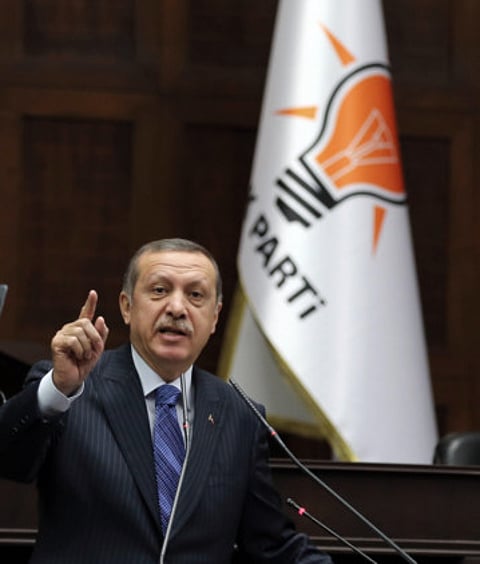Turkish Prime Minister Recep Tayyip Erdogan loses swing ahead of elections
Erdogan’s controversial policies have exposed deep fault lines within his own party

Ankara: Turkey’s once all-powerful prime minister is battling problems on both the domestic and international fronts that threaten to diminish his popularity ahead of an election cycle next year.
With three straight election wins under his belt, Recep Tayyip Erdogan has dominated Turkish politics for 11 years and enjoyed a free hand in crafting government policy.
But the tough-talking leader known as the “Sultan” who took office promising bold reforms has become an increasingly polarising figure in Turkey and now faces a key test in local polls in March.
“Since he took office, the prime minister has gradually shifted from pragmatist tendencies to ideological ones, from team work to personal decisions, from democracy to authoritarianism, from thought-out policies to impulsive ones,” Ilter Turan, professor at Istanbul’s private Bilgi University, said.
Erdogan’s controversial policies have exposed deep fault lines within his Islamic-leaning Justice and Development Party (AKP) and the government has lost support over its heavy-handed response to mass street protests that rocked the country in June.
He has irritated friends abroad with his defiant stance on regional crises, while the EU has only just resumed accession talks after a three-year freeze.
On the economic front, growth has slowed sharply and the Turkish lira has taken a tumble. Erdogan’s stature also took a knock when Turkey failed in its bid to host the 2020 Olympics and lost out to Dubai for the World Expo the same year.
At home, Erdogan is on the verge of losing one of his strongest allies over a bitter education dispute that has gripped the domestic political scene for several weeks.
The feud with influential Islamic preacher Fethullah Gulen, who lives in US exile, erupted after the government floated plans to close down a network of private schools run by the religious movement and seen as giving an unfair advantage to well-off students.
One analyst speculated that Erdogan would “make the mistake of his life” if he dared to challenge the Gulen movement which wields considerable influence in the state apparatus. Erdogan faced another confrontation with long-time ally Bulent Arinc, the deputy prime minister and an AKP co-founder, over his criticism of mixed-sex student accommodation.
A former Islamic firebrand, Erdogan has revived fears among secular modernists over a “hidden Islamist agenda” in the predominantly Muslim but staunchly secular country.
Turan said Erdogan’s increasingly authoritarian style was caused by his overwhelming election successes.
When he first came to power in 2002, Erdogan had an ambitious reformist agenda to build a “new Turkey” betting on strong economic growth, after a long legacy of military coups and rocky coalition governments.
He first waged war against once-untouchable generals in what critics described as “revenge” against the pro-secular military that authored three coups, and used courts to stifle dissent, prompting allegations of the “Putinisation of Erdogan,” in reference to the Russian president’s hardline stance against rivals.
“There is growing unease over prime minister Erdogan’s policies both at home and abroad,” Faruk Logoglu, deputy head of the secular opposition Republican People’s Party (CHP), said.
“The AKP government has been suffering fatigue after 11 years in power. Democracy and freedoms are being undermined. The price of wrong policies is an isolated and marginalised Turkey in the international arena.”
Critics say Erdogan’s creeping Islamisation backfired. A record one million people visited the mausoleum of modern Turkey’s founder Mustafa Kemal Ataturk, on the 75th anniversary of his death this month.
“This was unprecedented. It is obvious that Ataturk is enjoying a revival among Turks,” veteran columnist Semih Idiz wrote in the English-language Hurriyet Daily News.
In the Middle East, Sunni Muslim Turkey has found itself increasingly isolated as it grapples with the spillover of the Syrian civil war and an influx of refugees.
And relations with regional heavyweight Egypt soured after Erdogan criticised the military “coup” that ousted Islamist president Mohammad Mursi, prompting Cairo to kick out the Turkish ambassador.
“If you fail to fine-tune policies, you will narrow your room for manoeuvre in foreign policy and gradually isolate the country, which will in time have a negative impact on national interests,” columnist Hasan Cemal wrote in the independent Internet newspaper T24.
Erdogan is now setting his sights on becoming president if the constitution is changed to give the post sweeping US-style executive powers.
AKP bylaws preclude Erdogan from running for a fourth term as premier in 2015, while the current presidency expires in August next year. But his presidential ambitions may be foiled by parliament’s failure to agree on a new constitution to replace a post-1980 coup charter.
“Strong leaders want to leave a legacy which will always be remembered,” said Turan.
“Mr Prime Minister is constantly on a quest. That’s why he is rushing. This is leading to impatience both on domestic and international fronts.”
Sign up for the Daily Briefing
Get the latest news and updates straight to your inbox



